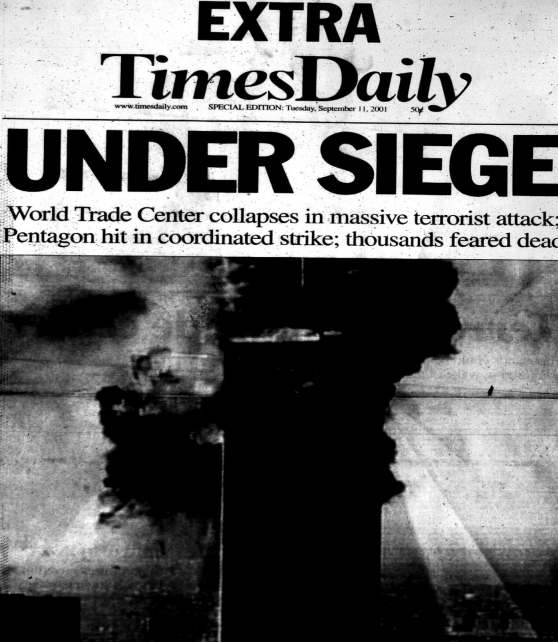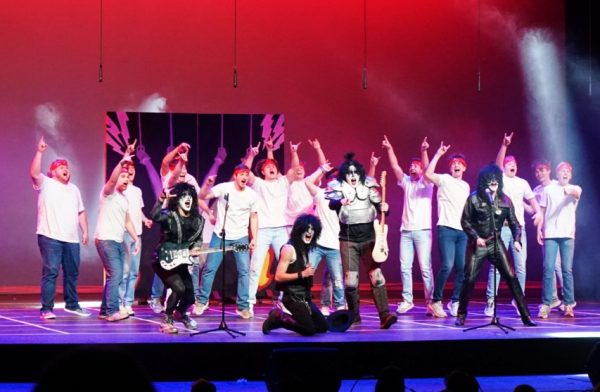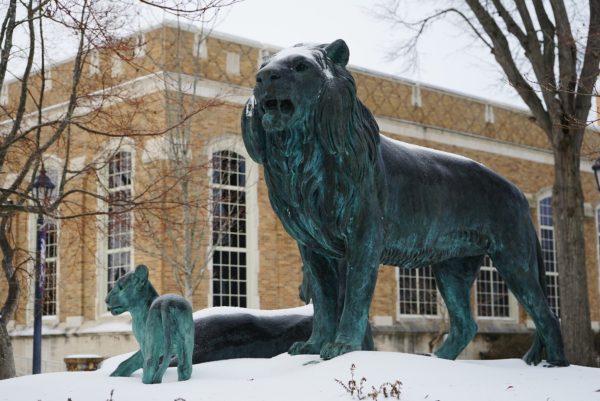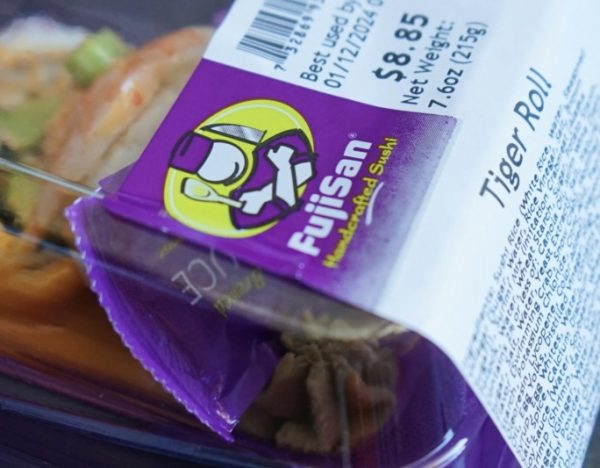How 9/11 affected the Shoals area
March 15, 2022
“A day that will live in infamy.”
Those were the words that forever marked the minds of the American public when Imperial Japan launched the deadliest assault on American soil in history. The attack claimed the lives of 2,390 civilians and military members. The scope of the attack was something that the American public struggled to comprehend in the following days and years ahead, shaking the nation’s sense of “geographic invincibility” to its core.
What many failed to realize is that this would not be the last attack that would fundamentally alter the history of the United States. September 11, 2001 started as any other Tuesday for Shoals residents. This peace would be drastically stricken by the news of a commercial airliner colliding with the World Trade Center in New York City.
“I had class that day and we lived a little over an hour from [UNA],” said Christy Jordan, a 2002 UNA graduate and student at the time of the incident. “I was listening to the radio and they broke in and said a plane had hit the World Trade Center. And I thought they were joking. I know that sounds odd, but it was just so surreal.”
Jordan said she called her professor and asked, “What can we do or should I come into class?”
“You know, what do I do?” Jordan said.
“And [my professor] said, ‘You do whatever you need to do today.’”
The 9/11 attacks had a drastic impact on the course of foreign policy, national security, and perception of public safety as a whole. Various conflicts had arisen in the middle east throughout the prior decade, but attacks on domestic soil had largely been unanticipated.
This lack of security foresight was exploited by 19 Al-Qaeda terrorists hijacking and weaponizing 4 commercial planes toward their targets. Three planes hit their intended targets, while the 4th was successfully overtaken by its passengers and crashed into a field in Pennsylvania.
“There were so many unknowns, but this felt like the beginning of World War II,” Jordan said. “This felt like our Pearl Harbor.”
This parallel to Pearl Harbor was a commonly held perception. The September 13th issue of the local Times Daily paper referred to the attacks as “Another Day of Infamy” in the local coverage of the immediate aftermath.
The article stated: “The United States of America has been attacked in an act of war that reminds us of the secret and unprovoked attack on Pearl Harbor 60 years ago. Except this time, the attack was not by a nation-state.
The deliberate and premeditated crash of two commercial airline jets into the twin towers of the World Trade Center in New York City and another plane crash at the Pentagon is more than symbolic.”
The attack claimed 2,977 victims, resulted in the total destruction of the World Trade Center, and inflicted critical damage at the Pentagon in Washington D.C. Additionally, The cost of domestic life was much greater than Pearl Harbor. 577 more Americans perished in the 9/11 attacks than in Pearl Harbor. Both attacks also served as de facto acts of war between the United States and their prospective perpetrators. Times Daily Staff Writer Russ Corey further noted the local response of residents.
“Throughout the Shoals on Tuesday, flags flew at half-staff mourning the deaths of untold numbers of Americans killed in terrorist attacks on New York and Washington D.C.,” Corey said in the article. “The attacks also sent Shoals residents on a mad dash to local gas stations as rumors of price increases and gas shortages spread throughout the country.”
The Times Daily further recalled how current council member, Dick Jordan, who was serving as Florence Mayor at the time, dispatched police officers to manage the flow of traffic at many local gas stations.
Laura Beasley is a long-time UNA faculty member and was also present in the shoals when the attacks occurred. Beasley had just got into her car from the doctor’s office and was driving across O’Neil Bridge when she heard a local radio station talking about the attacks. “They were talking about National Guard troops moving and all of this stuff going on, but they weren’t talking about what happened,” Beasley said. “I just was hearing this hyperbole about possible military movements and military jets over New York, but didn’t know what happened.”
Beasley said she went to her husband’s office at Merrill Lynch, an investment and wealth management division of Bank of America, and asked, ‘What’s going on? Is this happening in Alabama?’
“Because it was an attack on a financial institution, they told everybody to get your family and go home,” Beasley said. “[They said to] stay home until you hear something else. Because they didn’t know where the next attack would be, or if it would be against another financial institution.”
While Life in the Shoals did not change as drastically as in other areas of the country, Beasley noticed a much greater standard of security across the region after the attacks. “My son was three, and one of his favorite things to do was going down to the dam,” Beasley said. “He loved watching the boats get locked through the dam, and you couldn’t, they didn’t let you go down there after that. Security tightened up at all federal things like that. Any federal transportation, federal buildings. Definitely heightened security everywhere. And you still see that today.”
Locals also experienced increased tensions with members of the Islamic faith in the aftermath of the perpetration by radical factions of an otherwise peaceful religious group. UNA had a large portion of Turkish exchange students at the time.
Jordan remembered how the nationally-apprehensive mood permeated even the class rooms but was met with by her classmates.
“The next day we came into class and one of our friends, who was a Muslim from Turkey, walked in the room,” Jordan said. “You could just feel the tension in the air. It was so thick. It was almost like we knew that he was nervous. And we also wanted to assure him, ‘Hey, you’re still one of us. We’re still the same as we were before these people did this, and it does not change who we are.’ I’m not really one to speak for them, but I felt like we wanted to offer our Muslim students assurance.”
This spirit of sympathy was a very localized phenomenon in comparison to other areas of the country. The September 12th issue of Times Daily also reported on the backlash in areas like Texas, where a mosque had its windows shattered. A resident shot six bullets into the Islamic Center of Irving, resulting in property damage.
The article also noted the misplaced blame against members of the religion, as the FBI suspected Osama Bin Laden and his extremist group to be the perpetrators of the attacks. This uncertainty is another the commonality that many experienced throughout both Florence and North Alabama as a whole that day.
Janice Davis has been a resident of the nearby town of Rogersville for nearly 3 decades. She recalled the psychological trauma the event inflicted on American Citizens at the time and the surprising response of unity in the aftermath of the attacks.
Davis said she was watching Good Morning America when the attacks broke in on the news.
“Everybody had just taken it for granted that we live in the United States and we were safe, and that changed everybody’s way of thinking,” Davis said. “Here, where I live, there are a lot of Army helicopters and planes that would go over and for the longest time, I would just wonder if it were some kind of an attack. [9/11] was just such a shock to everybody.”
Davis said that it changed lives of both those who encountered the attacks or watched it through a television screen.
“It didn’t matter who you were,” Davis said. “You had that in common that you were from the United States, and you were proud of it. My mother said it was similar to when World War Two ended. She said she hadn’t seen it that patriotic since the war had ended.” This newfound national spirit of unity also resulted in an increased sense of duty amongst former members of the military and those seeking to enlist.
Veteran Tom McDaniel remembered this national fervor and the conclusion his prior deployment experience led him immediately upon hearing news of the attacks.
“When it first hit, I told the lady I was dating at the time, ‘This is Osama Bin Laden,” McDaniel said. “I was shocked at how many people did not know who Osama bin Laden was. I wanted to join back up, and many of my friends that had been in the military said the same thing. I mean, I was medically discharged, so I couldn’t go back in, but I wanted to. The day after was very solemn. Where I was working, it was like a deadness in the air. There was just a really heavy feeling. And then everybody started rallying and they wanted to go find and hunt these people down.”
Ultimately, it was the severity of this historical event that ended in such a drastic paradigm shift for foreign and domestic policy in the United States. The 9/11 attacks resulted in the creation of Federal Agencies like the Department of Homeland Security, and the Transportation Safety Administration.
Beasley said she remember the more controversial legislation that came about with the Patriot Act and following laws, resulting in varying amounts of mass surveillance.
“There are cameras everywhere,” Beasley said. “It’s a given that you’re being filmed publicly. You’re not private anymore. That’s the freedoms we have given up for the sake of fighting terrorism. And I think that’s pretty sad. I mean there’s an irony about it. And that all increased after 9/11. We gave up a lot of freedom.”
However, the attacks also resulted in an unprecedented amount of empathy and unity nationally. This stands in a stark contrast to the large amount of discourse that plagues modern society.
“Tragedy can get you out of your own head and remind you of the value of the people around you and how much we need one another,” Jordan said. “We really have more that brings us together than we do that divides us.”













